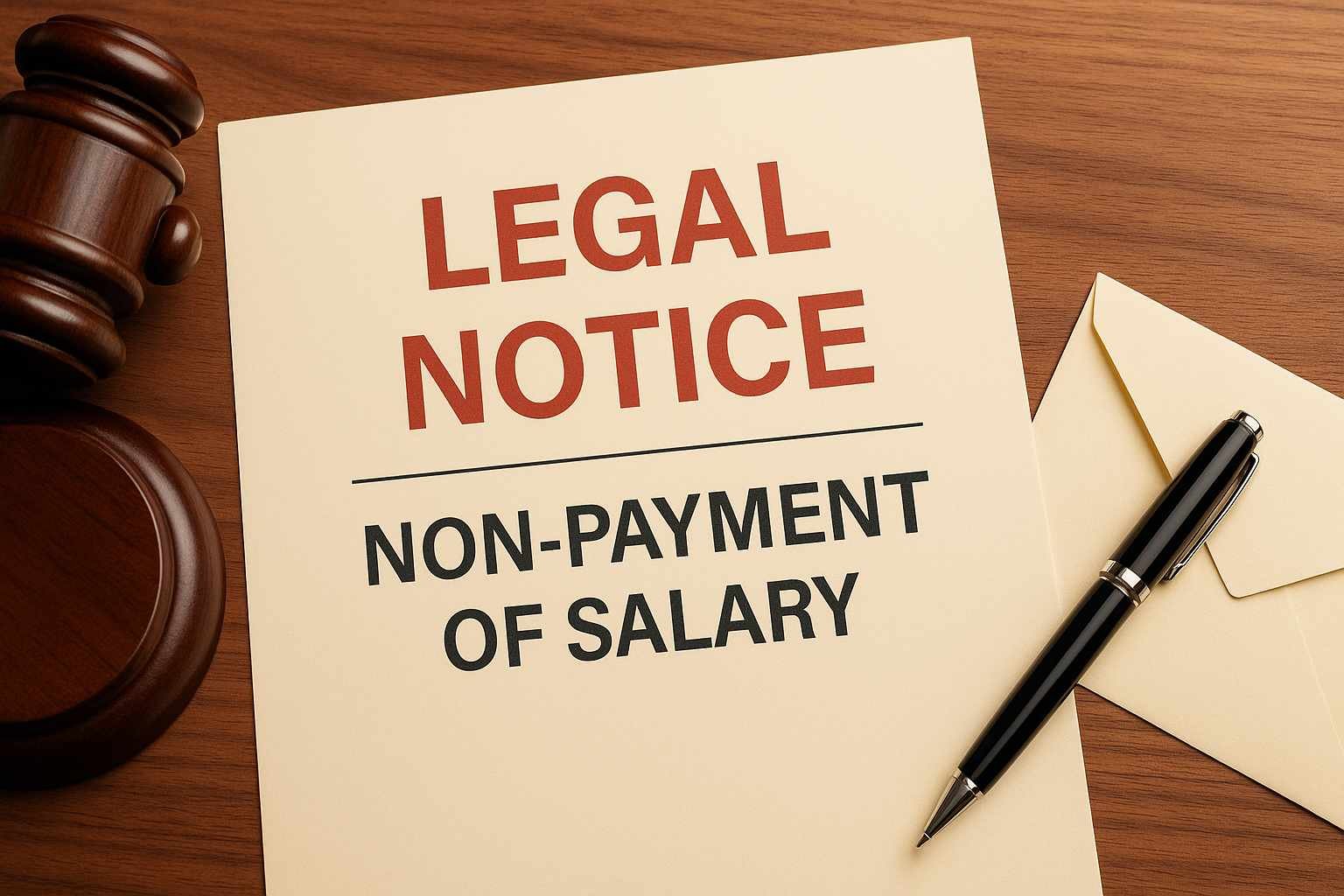On this page you will read detailed information about Employees Non-Payment Of Salary In India.
In the realm of employment agreements, the payment of salaries serves as the foundation for the employer-employee contract. It not only sustains livelihoods but also represents an employee’s contribution to the organization. Unfortunately, there are instances where employees find themselves facing the distressing situation of their employers failing to pay their wages. This article delves into the various legal remedies available to employees in India who encounter non-payment of salaries
The Significance of Timely Salary Payments
Before exploring the remedies, it is vital to emphasize the importance of timely salary payments. Apart from reflecting an employee’s value to the company, adequate pay ensures their financial security, thus enhancing their overall well-being. Late or nonpayment of wages disrupts this equilibrium, causing financial stress and eroding the trust and loyalty between the employer and employee.
Salaries are the cornerstone of an employee’s financial security beyond the confines of the workplace. From meeting basic needs to facilitating personal growth and aspirations, salaries form the bedrock of their economic life. Timely payments enable employees to fulfill financial obligations such as rent, bills, education, and healthcare expenses. Moreover, a reliable salary allows individuals to plan for the future, make informed financial decisions, and navigate unexpected challenges.
Timely salary payments go beyond mere financial transactions. They symbolize respect, value, and mutual commitment, shaping both the emotional well-being of employees and the dynamics of the workplace. Recognizing the multifaceted significance of timely salaries underscores the importance of addressing the issue of non-payment promptly and decisively. By honoring this pivotal aspect of the employer-employee relationship, organizations can foster a sustainable, productive, and harmonious work environment.
Exploring Remedies for Non-Payment of Salary
Informal Resolution and Communication
The initial step for employees facing non-payment of salary is to engage in open and respectful communication with their employer. Often, misunderstandings or administrative errors may be the cause of the delay, and a candid conversation can resolve the issue amicably. It is crucial for employees to maintain a record of all correspondence, establishing a timeline of their efforts to address the problem, which can be valuable should more formal action be required.
The path to resolution of non-payment of salary begins with effective communication. Engaging in open, respectful, and candid conversations with the employer can unravel misunderstandings, rectify errors, and foster an atmosphere of mutual understanding. By documenting these interactions, employees lay the groundwork for potential escalation if necessary. This informal approach not only offers a practical solution but also sets the tone for more constructive steps should the need arise.
Internal Company Procedures
Within the intricate tapestry of corporate structures, internal mechanisms exist to address a myriad of issues that can arise in the dynamic realm of employment. When faced with the unsettling cloud of non-payment of salary, employees can find solace in the internal avenues that organizations often provide for dispute resolution. These mechanisms, housed within Human Resources (HR) departments and guided by specific protocols, offer a structured path toward resolving the issue while upholding the organization’s ethos.
Many companies have established mechanisms for addressing workplace disputes, including issues related to non-payment of salary. HR departments or specific protocols may exist for employees to escalate their concerns. Engaging these internal channels can expedite the resolution process and demonstrate the employee’s commitment to resolving the issue within the organization’s framework. In these internal channels, a balanced blend of professionalism, documentation, and transparency paves the way toward equilibrium and harmony, aligning with the shared goal of nurturing a productive and amicable work environment.
Legal Notices and Demand Letters
If informal approaches fail, employees may consider sending a legal notice or demand letter to their employer. This formal communication describes the issue and the steps the employee has already taken, as well as outlines the desired remedy. By sending a legal notice, employees demonstrate their intent to seek legal redress, which often motivates employers to take immediate action.
Government Intervention and Labor Departments
When an employer remains unresponsive even after legal notices or demand letters, employees can turn to regulatory or labor departments of the government for support. These organizations are responsible for ensuring employers’ compliance with labor laws and regulations. By filing a formal complaint, employees can initiate an investigation, mediation, or other intervention aimed at rectifying the non-payment problem.
In the previous post, we had shared information about Safeguarding Public Servants: An In-depth Analysis Of Section 332 IPC And Its Significance In Indian Law, so read that post also.
Legal Recourse for Non-Payment of Salary
Breach of Employment Contract
If an employment contract exists, the failure of the employer to pay wages may be viewed as a breach of that contract. Employees can explore legal options based on the conditions stated in the employment contract. However, it is crucial to thoroughly understand all terms and conditions, as certain contracts may contain provisions that impact the employee’s entitlement to pay. Pursuing breach of contract claims requires a comprehensive understanding of the employment contract’s terms, potential clauses that influence the employee’s rights, and the complexities of legal action. Seeking legal counsel and evaluating potential outcomes are essential in making informed decisions aligned with the pursuit of equitable redress.
Wage and Labor Laws
Labor laws in India typically mandate timely payment of wages to employees. These laws ensure that employers comply with their financial obligations towards employees. Employees who face non-payment of salary can seek redress by turning to labor courts or other relevant legal agencies. Labor laws act as sentinels guarding the sanctity of the employer-employee relationship. When the unsettling reality of non-payment of salary emerges, employees can turn to these laws for protection and redress. The legal recourse through labor courts serves as a bastion of justice, upholding the principles of fairness, equity, and timely compensation. While navigating this legal avenue, employees must be cognizant of the potential benefits and challenges, ensuring that their pursuit of justice aligns with their goals and circumstances.
Small Claims Court
In cases involving relatively smaller amounts, employees might opt to pursue remedies through small claims courts. These courts handle disputes with simplified procedures, allowing individuals to present their cases without legal representation. If successful, employees can obtain judgments for unpaid wages, which can then be enforced against the employer. Small claims court offers accessible justice for employees navigating the daunting terrain of non-payment of salary. The streamlined process, absence of mandatory legal representation, and potential for obtaining enforceable judgments make this avenue an attractive option for cases involving modest amounts. Careful consideration of the complexities of the case and capacity to navigate the legal landscape is advisable when choosing this path.
Mediation and Arbitration
In some jurisdictions, mediation or arbitration can serve as an alternative to settling disputes without going to court. Facilitated by impartial third parties, these alternative conflict resolution techniques promote discussions between parties to arrive at a mutually acceptable conclusion. Mediation and arbitration offer quicker and less adversarial processes compared to traditional litigation. They harness the potential of negotiation and communication, enabling employees and employers to engage in open discussions and seek common ground. Mediation and arbitration emerge as guiding lights for employees navigating the intricate maze of non-payment of salary disputes.
Case Laws
To gain insights into how courts have ruled on non-payment of salary cases in India, several notable precedents serve as references. These cases provide valuable guidance for employees seeking legal recourse:
- J. Aswartha Narayana vs. The State of Andhra Pradesh, 2021: The Supreme Court of India ruled that non-payment of part of the eligible salary to employees in service violates Article 21 of the Constitution of India. The petitioner argued that the deferment of part of the salary contravened Article 300-A of the Constitution of India.
- Union of India (UOI) vs. Ram Nath Chitory, 1966: The Supreme Court held that if an employer fails to pay wages within the prescribed time, the employer is liable to pay compensation to the employee.
- Air India Statutory Corporation vs. United Labour Union & Ors, 1996: The Supreme Court held that wages under the Payment of Wages Act, 1936, include not only basic wages but also other allowances that are ordinarily payable to the employee.
Related Statutes
Several statutes in India ensure fair and timely remuneration for employees. These statutes play a crucial role in safeguarding the rights of employees and regulating salary payments. The following acts are pertinent to the issue of non-payment of salary:
- Equal Remuneration Act, 1976
- Payment of Wages Act, 1936
- Payment of Bonus Act, 1965
- Minimum Wages Act, 1948
In recent times, these four statutes have been consolidated into a single labor code known as “The Code on Wages, 2019.”
Conclusion
Non-payment of salary can significantly impact an employee’s financial situation and job satisfaction. While it is the responsibility of employers to provide timely and accurate remuneration, disagreements may arise. Employees have various legal options available, ranging from informal discussions and internal procedures to formal legal action, government intervention, and alternative dispute resolution techniques.
To navigate these remedies effectively, employees must be aware of their rights and responsibilities under the law and any employment agreements. Seeking legal counsel can help determine the best course of action based on the unique circumstances. By pursuing available remedies, employees can not only recover their unpaid salary but also assert their rights and contribute to fair and ethical workplace practices.
Disclaimer
The information and services on this website are not intended to and shall not be used as legal advice. You should consult a Legal Professional for any legal or solicited advice. While we have good faith and our own independent research to every information listed on the website and do our best to ensure that the data provided is accurate. However, we do not guarantee the information provided is accurate and make no representation or warranty of any kind, express or implied, regarding the accuracy, adequacy, validity, reliability, availability, or completeness of any information on the Site. UNDER NO CIRCUMSTANCES SHALL WE HAVE ANY LIABILITY TO YOU FOR ANY LOSS OR DAMAGE OF ANY KIND INCURRED AS A RESULT OR RELIANCE ON ANY INFORMATION PROVIDED ON THE SITE. YOUR USE OF THE SITE AND YOUR RELIANCE ON ANY INFORMATION ON THE SITE IS SOLELY AT YOUR OWN RISK. Comments on this website are the sole responsibility of their writers so the accuracy, completeness, veracity, honesty, factuality and politeness of comments are not guaranteed.
So friends, today we talked about Non-Payment Of Salary In India, hope you liked our post.
If you liked the information about Non-Payment Of Salary In India, then definitely share this article with your friends.
Knowing about laws can make you feel super smart ! If you find value in the content you may consider joining our not for profit Legal Community ! You can ask unlimited questions on WhatsApp and get answers. You can DM or send your name & number to 8208309918 on WhatsApp









